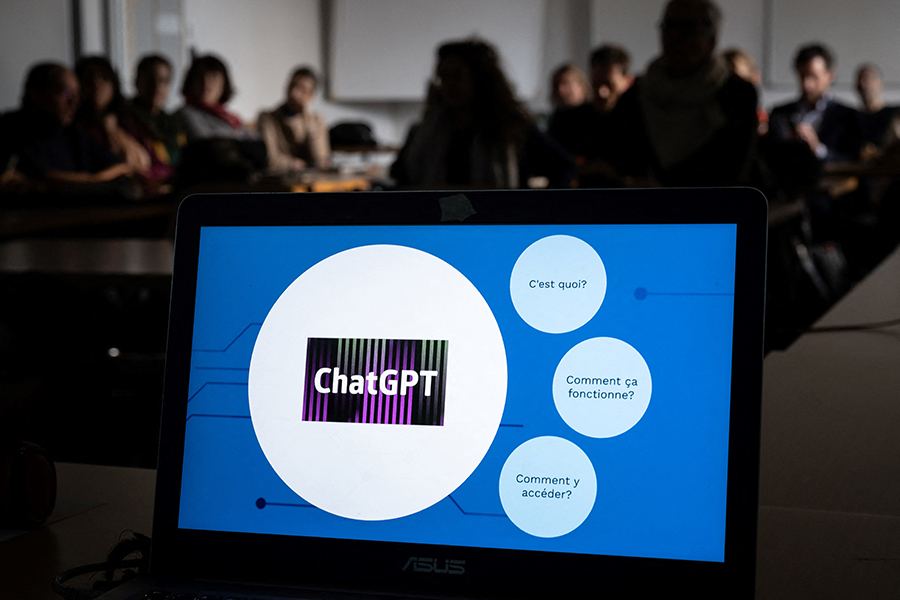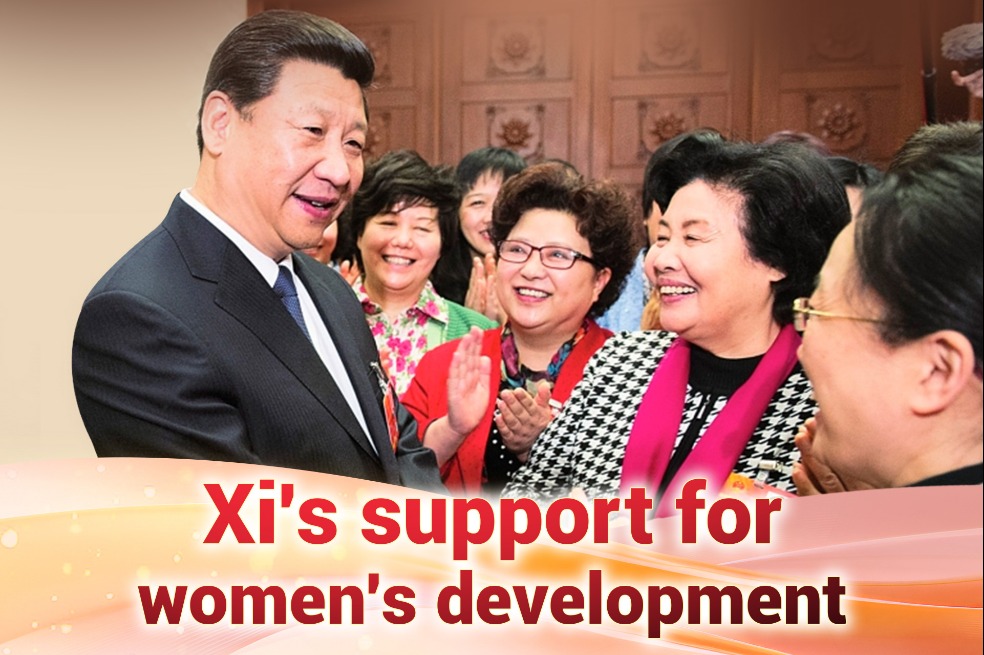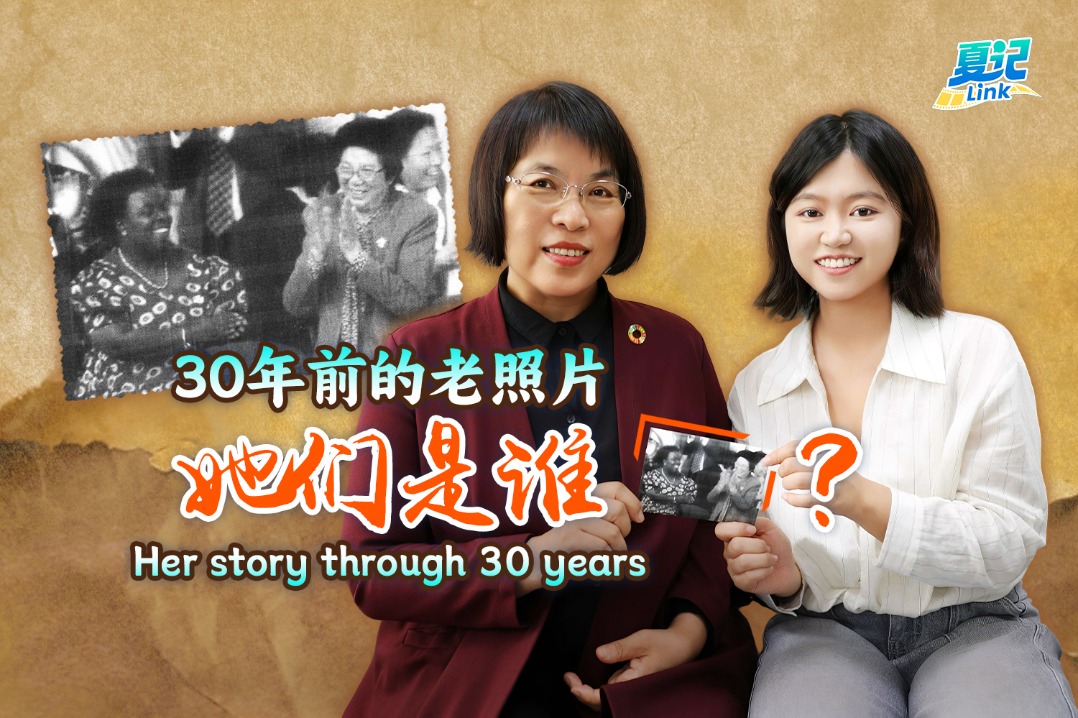China ushers in golden era of AI, chatbots
By FAN FEIFEI | CHINA DAILY | Updated: 2023-02-17 07:03

AIGC-related technologies, including ChatGPT-like tools, drive content production for media, entertainment, education
Chinese tech companies are ramping up efforts to make a foray into the fast-growing artificial intelligence-generated content sector and roll out AI-powered chatbots or products similar to ChatGPT, which has taken the world by storm since its launch in November due to its advanced conversational capabilities.
Launched by US-based AI research company OpenAI, ChatGPT is able to mimic human-like responses to prompts with AI-generated content, and assist people with tasks such as writing essays and scripts, drafting business proposals, creating poetry and even checking program bugs by leveraging machine-learning algorithms.
Experts said that AI-generated content and ChatGPT-related technologies are likely to become a new engine driving innovation in content production and free human creators from tedious tasks, enabling them to focus on creative thinking, with immense application potential in a wide range of fields like culture, media, entertainment and education.
Chinese enterprises possess the advantages of offering users AI-powered conversational results in the context of the Chinese language, and more efforts are needed to pool resources in improving algorithm models, computing power and natural language processing abilities, they added.
Alibaba Group confirmed on Feb 8 that it is developing a ChatGPTstyle AI tool, which is currently under internal testing. The company did not give a timeline for its ChatGPT rival to be launched.
Frontier innovations, such as large language models and generative AI, have been the company's focus areas since the formation of Damo Academy, a research institute launched by Alibaba in 2017, said an Alibaba spokesperson.
"As a technology leader, we will continue to invest in turning cutting-edge innovations into value-added applications for our customers, as well as their end users, through cloud services," the spokesperson added.
Baidu Inc, China's largest search engine company, announced on Feb 7 that a similar AI chatbot project called Ernie Bot will complete internal testing in March before being launched publicly.
The Beijing-based company has invested large sums of money in developing its Ernie system, a large-scale machine-learning model that has been developed over several years, and possesses in-depth semantic comprehension and generation capabilities.
Robin Li, co-founder and CEO of Baidu, said in January that as the threshold for technology applications continues to lower, creators are expected to usher in the golden era of AI.
"AI has gone from understanding pictures and text to generating content," Li said, adding that AIGC will subvert existing content production models in the next decade, and AI has the potential to meet the massive demand for content at a tenth of the cost and a hundred or a thousand times faster.
Other Chinese tech companies have jumped on the chatbot bandwagon. JD Cloud, the cloud computing branch of Chinese e-commerce platform JD, announced on Feb 10 that it will launch a ChatGPT-like product ChatJD for industrial applications based on its AI platform Yanxi.
ChatJD features an AI-powered machine dialogue platform that can generate content and understand users' intentions. The service is expected to be used in fields such as retail and finance.
NetEase announced on Feb 9 that its education subsidiary Youdao has been working on AI-generated content and is promoting its application in the education sector. Intelligent speech and AI company iFlytek said ChatGPT-related technology will be first used in its learning machine.
Pan Helin, co-director of the Digital Economy and Financial Innovation Research Center at Zhejiang University's International Business School, said ChatGPT, as a milestone in AIGC-related technologies, uses reinforcement learning from human feedback to train the large language model, with significant enhancements in natural language processing capacities that improve response logic.
It features strong semantic understanding and logical capabilities based on context, but "it has higher requirements for algorithms and computing power, which relies on considerable capital investments", Pan said.
He noted that ChatGPT may assist humans in writing texts and computer code, as well as analyzing and processing data, enabling the latter to be more productive and efficient.
"Therefore, the application of ChatGPT-related technology will lower the threshold of many jobs like content creators and programmers and enhance work efficiency, but it will not eventually replace the human workforce," Pan added.
According to a report released by Tencent Research Institute, AIGC will lead to a new revolution in the field of digital content, bolster innovation in the digital culture industry and facilitate the development of chatbots, digital humans and the metaverse.
"Chinese tech enterprises have unique advantages in expanding AI application scenarios across the globe compared with their foreign peers, based on China's enormous domestic social network and the world's largest number of internet users," said Chen Jia, an independent researcher in international strategy.
China has made significant progress in developing the AI industry. A Stanford University report showed that China filed more than half the world's AI patent applications in 2021, and continues to lead the world in the number of AI journals, conference papers and related publications.
Baidu, Alibaba and Tencent have invested heavily in promoting the commercial use of AI, and some Chinese AI unicorns have grown rapidly in recent years, Chen said. However, he noted that Chinese tech companies still lag behind top-notch foreign competitors in fundamental R&D input and comprehensive innovation abilities.

A recent study by investment bank UBS said that ChatGPT has gained 100 million monthly active users, making it the fastest-growing consumer application in history. Moreover, ChatGPT has sparked somewhat of an AI race among the world's major tech players.
Microsoft has announced an AI-powered Bing search engine and Edge browser, which will be underpinned by ChatGPT technology. Google has also unveiled a new chatbot tool dubbed Bard to respond to the challenge posed by ChatGPT.
Lu Yanxia, research director at market consultancy IDC China, said she is upbeat about Chinese tech companies' layout in ChatGPT-like products and the AIGC segment, as they have gained an upper hand in dealing with Chinese text information and accumulated massive amounts of data in related fields compared with their foreign peers, adding Chinese enterprises should invest more to improve language models and related algorithms.
Currently, ChatGPT has some limitations in the accuracy and scope of responses and will not thoroughly subvert the search engine market, she added.
AIGC-related stocks have continued to rally in the A-share market, but experts expressed concern that the ChatGPT-like concept might be overhyped and suggested that people should invest rationally in the stock market. Meanwhile, a new set of problems will likely emerge, including ethics, copyright protection, privacy and data security.
Securities Times, a Shenzhen, Guangdong province-based national financial newspaper, last week cautioned against risks in chasing ChatGPT-concept stocks. It said in a front-page editorial that although some sought-after concepts have been successful, many more new ideas haven't been commercialized or require more time to prove.
Some people are keen to hype fake concepts, luring others into the scheme of "pump and dump", leaving investors in tears, it said, suggesting that investors should not invest blindly.
The Shanghai Stock Exchange issued supervisory work letters on Feb 8 to Cloudwalk Technology and Speechocean, which queried the dramatic rise in their share prices over the past eight trading days amid the frenzy around the ChatGPT chatbot. The two AI companies' shares slumped by 9.35 percent and 2.68 percent, respectively, the following day.
"At present, the exploration of ChatGPT-related technology is still at a nascent stage, and its commercial application scenarios and profit models are not clear," Pan said. Investors should make rational decisions and remain cautious about the potential risks of blind speculation, he added.
The use of ChatGPT-style conversational chatbots and AIGC-related technologies also raises concerns about ethics, copyright protection, academic cheating and leaks infringing on personal privacy, said Guo Tao, deputy head of the China Electronic Commerce Expert Service Center.
"In the past, AIGC was mainly used in word processing. Its application scenarios have been expanded, buoyed by the maturity and popularity of deep-learning models, which are capable of dealing with text, voice, code, image, video and other types of content," Guo explained.
However, there is still a long way to go to realize the large-scale commercialization of AIGC as the supporting technologies and related laws and regulations are far from being mature, he added.
Chen Duan, director of the Digital Economy Integration Innovation Development Center at the Central University of Finance and Economics, said AIGC will greatly unleash people's demand for expressing their creativity, and drive the evolution of content production's commercial models. Although AIGC is in the initial stages of development, Chen is bullish on its prospects.
Market consultancy Gartner said one of the most visible and powerful AI techniques coming to market is generative AI. It predicts that by 2025, generative AI will account for 10 percent of all data created, compared with less than 1 percent in 2022, and could be used for a range of activities such as creating software code, facilitating drug development and targeted marketing.
























